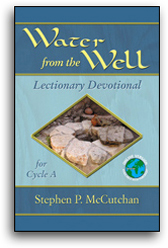Epiphany 4 / OT 4
Devotional
Water From the Well
Lectionary Devotional For Cycle A
Who may dwell on your holy hill?
-- Psalm 15:1
Despite our repeated attempts to complicate the truth of God, both in the Old and New Testaments, there is a core set of truths that reflect a universal yearning for reconciliation of the divisions among humanity. Jesus summed up the law in terms of the two basic relationships of love of God and love of neighbor. Micah summed it up in three parts -- to do justice, love mercy, and walk humbly with your God. The psalmist also spoke against those acts that divided human from human. These are people who do not do what is right and speak the truth from their heart; people who do slander with their tongue and do evil to their friends and take up a reproach against their neighbors. In addition, the psalmist recognized the power of economics to divide and added, "who do not lend money at interest, and do not take a bribe against the innocent." Try to picture such admonitions becoming an ethic for nations in their foreign policy. If nations chose to live in this way with other nations, would we not be taking giant strides toward peace? Since Jesus commanded his disciples to go and teach the nations what he has taught us (Matthew 28:19-20), do we not have a responsibility to first reflect such behavior among ourselves and then to commend such behavior as practical politics for the nation?
-- Psalm 15:1
Despite our repeated attempts to complicate the truth of God, both in the Old and New Testaments, there is a core set of truths that reflect a universal yearning for reconciliation of the divisions among humanity. Jesus summed up the law in terms of the two basic relationships of love of God and love of neighbor. Micah summed it up in three parts -- to do justice, love mercy, and walk humbly with your God. The psalmist also spoke against those acts that divided human from human. These are people who do not do what is right and speak the truth from their heart; people who do slander with their tongue and do evil to their friends and take up a reproach against their neighbors. In addition, the psalmist recognized the power of economics to divide and added, "who do not lend money at interest, and do not take a bribe against the innocent." Try to picture such admonitions becoming an ethic for nations in their foreign policy. If nations chose to live in this way with other nations, would we not be taking giant strides toward peace? Since Jesus commanded his disciples to go and teach the nations what he has taught us (Matthew 28:19-20), do we not have a responsibility to first reflect such behavior among ourselves and then to commend such behavior as practical politics for the nation?


